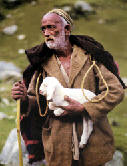| Reflections on The Psalms |
|
 |
||
|
Psalm 5
Must one pray aloud to be heard? I think there are other scriptures that suggest otherwise, but David did, and we know Daniel did as well, when it would have been far safer for him to pray silently. The NIV renders the word for meditation as "sighing." It is not merely a matter of sitting and meditating, but of groaning or muttering. Also the idea of directing prayer comes from Hebrew root which means "to set in a row" or to arrange. Perhaps prayer lists are not a bad idea. It is hard to visualize God becoming weary with long, meandering prayers, but we might do well to get to the point. The Hebrew for "will look up" means "to lean forward," which suggests expectation (NIV).
It is quite likely that David had a particular bloody and deceitful man in mind when he wrote this. Reading this so many centuries later, we will naturally generalize. But David is not generalizing in verse 8 when he speaks of his enemies. When we read the story of Absalom, the flattery, the unfaithfulness becomes especially painful. But there is an interesting aside here. David never names anyone in his prayers asking God to punish. One wonders if this is to avoid judging the men in question. We never know all the facts in a case, and there may be mitigating circumstances. We may think a man is lying when he really is not. Therefore to pray against the man would be wrong while praying that God will punish the unnamed liar would not be. If the man is innocent, the curse will not come. And it is especially evil to curse an innocent man. David prayed against his enemies without naming them. Thus, if a man really was not his enemy, David had done no harm.
And David does not claim righteousness. As he does not name his enemies, so he does not name himself, but offers a generic blessing for the righteous. |
The
Sinless Life
Youth in Action |
|||

